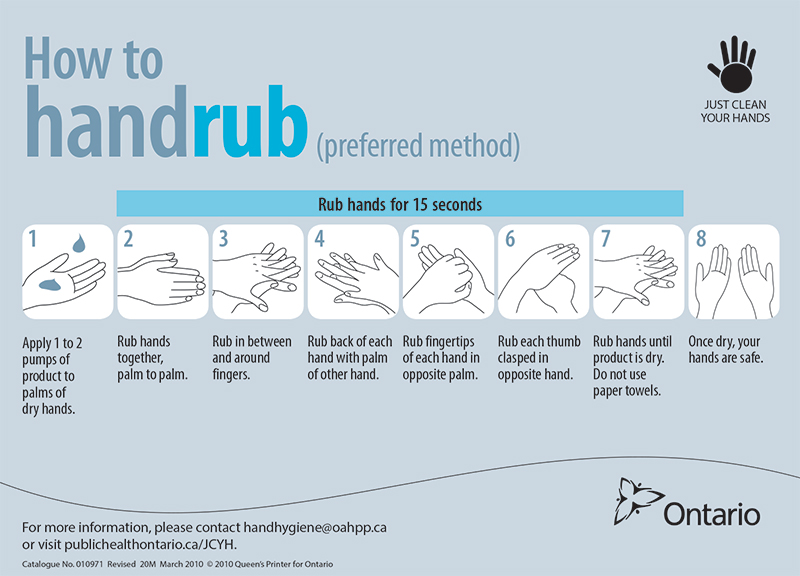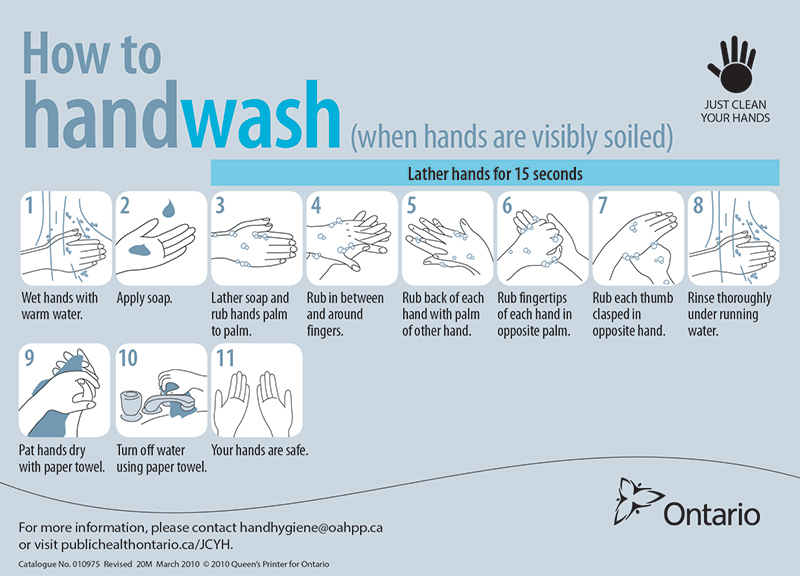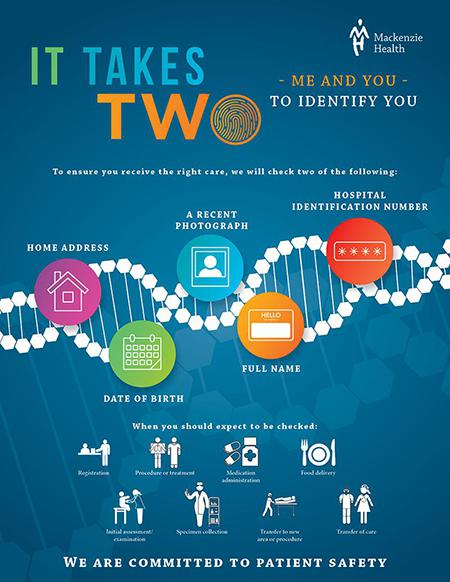Safety
At Mackenzie Health your safety, health and comfort are a priority. Please see the information below for more details.
We do not allow latex balloons on site due to latex allergies, and for the safety of children. Mylar balloons are permitted.
Cellular phones and other two-way devices can be safely used in the main lobbies, hallways and most patient and visitor waiting rooms. You must turn these phones and devices off in the following highly sensitive patient care areas:
- Coronary Care Unit (CCU)
- Dialysis Units (all units)
- Diagnostic Imaging
- Emergency Department (patient care areas)
- Endoscopy Unit
- Family Birthing Centre
- Intensive Care Unit (ICU)
- Level II Nursery
- Mental Health (inpatient unit)
- Operating Rooms
- Post Anaesthesia Care Unit (PACU)
Electrical equipment such as razors or blow-dryers must be CSA or Ontario Hydro approved. All items must be inspected by a staff member prior to use in hospital. Please contact your nurse if you have any questions regarding electrical items brought from home or to arrange to have your equipment inspected.
Mackenzie Health takes every precaution to protect against fires, and our staff practice fire safety procedures regularly. Fire exits are clearly marked throughout the hospital. When you hear the fire alarm, please remain in or return to your room. We will inform you should any action become necessary. During an alarm, elevators will either return automatically to the main floor or the top floor so travel between floors is only possible via the stairwells.
Mackenzie Health strongly discourages placing real flowers, real plants, fans and humidifiers in patient rooms and clinical areas as these items can carry germs and bacteria that may pose a risk to our patients.
We strive to maintain as clean and sanitary a patient care environment as possible, through detailed and regular washroom and furniture cleaning, dusting, wiping, vacuuming, mopping and waste removal. If you have any concerns or comments regarding the cleanliness of your room, please call the Service Response Centre at ext. 2310.
Hand Hygiene is the best defense against the spread of germs. Hand hygiene refers to cleaning your hands with soap and water or an alcohol-based hand rub. If you are ill, please do not visit the hospital unless you have an appointment that cannot be moved; you will be asked to wear a mask.
All Mackenzie Health staff, physicians and volunteers receive training to safeguard our patients from germs and diseases. That training includes the use of personal protective equipment (e.g. gowns, gloves, masks and eye protection) as appropriate as well as the application of routine infection prevention and control protocols. Staff and patients alike play an important role in reducing the spread of infectious diseases by cleaning their hands regularly and thoroughly. Hand hygiene stations are located in all main lobbies, on patient care units and outside patient rooms.


Medications can be powerful healers. They can also be dangerous if taken incorrectly. Please help us to help you by being aware of your pre-admission medications, both prescription and over the counter as well as notify your health care professional about any natural products you might be taking.
Your complete medication list is compared to prescribed medications in hospital to identify any possible conflicts. This process is called Medication Reconciliation.
Prior to admission:
- Maintain an accurate list of all your medications. This will be useful if admitted to hospital. Include all medications as well as over-the counter and natural products.
- Ask your community pharmacist(s) to print a list of your medication history, not only currently prescribed medications, but those that you have been taking in the last few months to ensure they do not conflict with any new ones
- If possible, participate in the MedsCheck Process at your community pharmacy. This is an opportunity for your local pharmacist to review your medications and identify any issues that may need to be followed up.
Upon admission to hospital:
- Bring all your medications with you. Be sure to tell your caregivers how you are actually taking these medications (according to the directions on the prescription or otherwise).
- Ask about newly prescribed medications. What are the possible side-effects and dose? Feel free to speak with the pharmacist who works on your unit.
- Tell your caregiver about any allergic reactions or side-effects to newly prescribed medication. Reactions could include itchiness, hives, rashes, swollen tongue, etc
Upon discharge from hospital:
- When you are being discharged, seek clarification around any instructions regarding your medication.
- Have any medications been added, stopped, or changed. Clarify what medications you should continue taking that you were taking prior to admission.
When you are back in the community filling your discharge prescriptions at your local pharmacy please bring a copy of the After-Visit Summary given to you at discharge. Your community pharmacist can review any changes to your medication regimen with you.

At Mackenzie Health, we are committed to patient safety.
A patient identification band will be applied when you attend Mackenzie Health. To ensure that we deliver excellent quality care to every patient, every time, we will routinely check at least two identifiers to confirm your identity at critical steps in the care journey.
This means that you will be asked many times during your admission/care journey to confirm your identity. It is not because we don’t remember who you are, but because we want to make sure that you get the medication, procedure, or care that was intended for you.
To ensure you receive the right care, we will check two of the following:
- Home address
- Date of birth
- A recent photograph
- Full name
- Hospital identification number (Y or MRN number)
Information can be confirmed by the patient or a family member.
You can expect to be checked:
- At registration
- Before the initial assessment/examination
- Before a procedure or treatment
- Before specimen collection
- Before medication administration
- Before transfer to new area or procedure
- When the meal tray is delivered
- When a new member of the healthcare team becomes involved in your care
Verifying the identity of patients using two independent identifiers is essential to avoid harmful incidents such as allergic reactions, privacy breaches, medication errors, and wrong-person procedures.
If we haven't done it, ask us! You are a partner in your care.
Your health condition, medications and time spent in bed may decrease your balance and strength while in hospital. These safety tips will help to minimize your risk of falling.
While in-hospital please:
- Always wear proper footwear by wearing non-skid slippers, supportive walking shoes or runners.
- Make sure the call bell at your bedside is within easy reach
- Let your health care team know if you need to use the bathroom often or in a hurry. Use a urinal or bedside commode if this is easier for you.
- Keep items within easy reach. Overreaching for the phone or bending down to the floor for your slippers, increases the risk of falls.
- Minimize clutter in your room
- Wear your glasses, if you require them to see better
- Ask for help when moving to or from bed and chair
- Lock your wheelchair brakes
- Use gait aids prescribed for you such as a walker or cane for walking.
A word about confusion:
If you or your loved one is having trouble concentrating or remembering things, please let a staff member know. There may be reasons why this could be happening, any of which may contribute to a fall.
To help you identify the members of your health care team, all of our physicians, staff and volunteers wear hospital identification. If you do not know who someone is, ask to see his or her identification.
For your safety, our on-site security team patrols the hospital 24 hours a day.
Many elements in the environment can trigger or influence health. Mackenzie Health is committed to providing a safe and inclusive environment for all and strive to eliminate the use of products with scents and fragrances to prevent any adverse reactions in people working and/or visiting the hospital premises.
In consideration of others who may suffer from chemical sensitivities and/or allergies, we request that you refrain from wearing scents such as perfumes, colognes, hairspray or aftershave when at Mackenzie Health.
Mackenzie Health is a smoke-free environment. The use of tobacco products is prohibited in all areas of the hospital including the inside of each building and the exterior grounds and parking lots. This policy applies to staff, volunteers, students, visitors and patients who are within the boundaries of any of Mackenzie Health's locations including Mackenzie Richmond Hill Hospital and Cortellucci Vaughan Hospital.
Mackenzie Health is in compliance with provincial and federal legislation for our healthcare facility, including: Smoke-Free Act of Ontario, Federal Tobacco Act, Occupational Health and Safety Act and Ministry of Health and Long-Term Care. Local public health units carry out inspections and respond to complaints to enforce the act and those found smoking on hospital grounds may be subject to a fine.
Smoke-Free Ontario Act: Hospitals and Hospital Properties
The Smoke-Free Ontario Act prohibits smoking tobacco in all enclosed workplaces and public places, to protect workers and the public from the hazards of second-hand smoke. This includes public and private hospitals and psychiatric facilities.
Under the Act:
- Smoking is prohibited inside all public and private hospitals
- Effective January 1, 2018, the grounds of all hospitals in Ontario must be completely smoke-free.
- Sale of tobacco is prohibited within hospitals
Please help us be a smoke-free facility by refraining from smoking on Hospital property.
For more information about the Smoke-Free Ontario Act:
Visit the Smoke-Free Ontario Act website at ontario.ca/smokefree
In the hospitals patients and families may experience health/life emergencies, worry, and fear — emotions and conditions that can bring out expected and/or unexpected behaviors and actions. Hospitals are workplaces covered under the Occupational Health and Safety Act (OHSA). Under the Act, employers and workers must act in accordance with their authority to prevent workplace violence and create safe environment for all. Patients and families have a role, too.
Please note that Mackenzie Health has zero tolerance for violence and required action to prevent occurrences of violence will be taken. Physical or verbal abuse will not be tolerated at Mackenzie Health.
Doctors, nurses, pharmacists and other health care team members are committed to making sure that your care is as safe as possible but patients and family members can help too. Here are some tips that can help you be a part of the safety team at the hospital.
Speak up if you have any questions or concerns about your care.
One of the best ways of getting the best health care is to be an active member of your health care team. This means asking questions so that the best decision can be made. It also means coming prepared for your medical treatment and knowing what to do when you go home.
Write down your questions and bring them with you when you see your health care team member. It is important to understand as much as possible about any medical problem you have (your diagnosis), treatment or procedure you will have, and the medicine you should take and how to take it. Don't be afraid or embarrassed to ask.
Write down your answers as you are talking with your health care provider so that you can review them later. Ask a family member or friend to come with you when you talk to your health care team. It is easy to be overwhelmed by a lot of information and your family member or friend can help you ask important questions. If you need an interpreter, ask in advance if there will be one there, or bring someone who can interpret for you.
Tell a member of your health care team about your past illnesses and your current health condition.
Tell your health care team everything you can, even if you think they already know, and even if you think it is not important. This includes your ongoing illnesses such as diabetes or heart disease, whether you have seen another doctor or gone somewhere else for health care, any surgery or recent visits to the hospital, and any medications that you are taking.
Bring all of your medicines with you when you go to the hospital or to a medical appointment.
Some medicines combine with each other in your body and can produce bad reactions. To protect you, make sure that your health care team knows about everything that you are taking. This includes prescription and over-the-counter medicines, natural and herbal products and dietary supplements such as vitamins and herbs.
When you go to the hospital or to a medical appointment, it is helpful if you put all of your medicines in a bag and take them with you. If you cannot bring the medicines with you, bring an up-to-date list of your medications.
Tell your health care team if you have ever had an allergic or bad reaction to any medicine, food or latex.
This includes reactions to any medications, including drugs used during surgery and medications used before receiving certain x-ray procedures.
In the hospital, you can help ensure your safety
- Cleaning your hands is the best way to fi ght the spread of infection. Clean your hands frequently. It is a good idea to ask everyone - your health care team and visitors - to clean their hands. Guidelines are posted in the hospital or you may ask your health care team for assistance.
- Ask sick visitors to refrain from visiting while you are in the hospital.
- Ask every person to identify themselves when they come into your room.
- Before you go in for a procedure, tell the health care provider your name, ask to make sure you are the patient they are expecting and that they are doing the correct procedure.
- Before you receive any medication, make sure the health care provider checks your hospital ID bracelet. If you receive medication in an outpatient setting, make sure your health care provider checks your full name and address.. Ask questions about medications that you are about to receive, such as the name and what it is used for. If it doesn't look like what you usually take, ask why.
Make sure you know what to do when you go home from the hospital or from your medical appointment.
Before you go home, ask as many questions as you can to make sure you understand:
- What treatment you received
- Whether you will need a prescription filled
- What symptoms to watch for and who to call if something does not feel right
- What medicine you must take, how to take it and any side effects
- What foods you should eat and not eat
- When you can go back to normal activities, such as work, school, exercise and driving
- What follow-up appointments you will need and who will make them.
Your health care team promises to work with you and welcomes your questions and participation in the work of the safety team here at the hospital.
Adapted from the Ontario Hospital Association's Patient Safety Support Service brochure: "Your Health Care Be Involved".